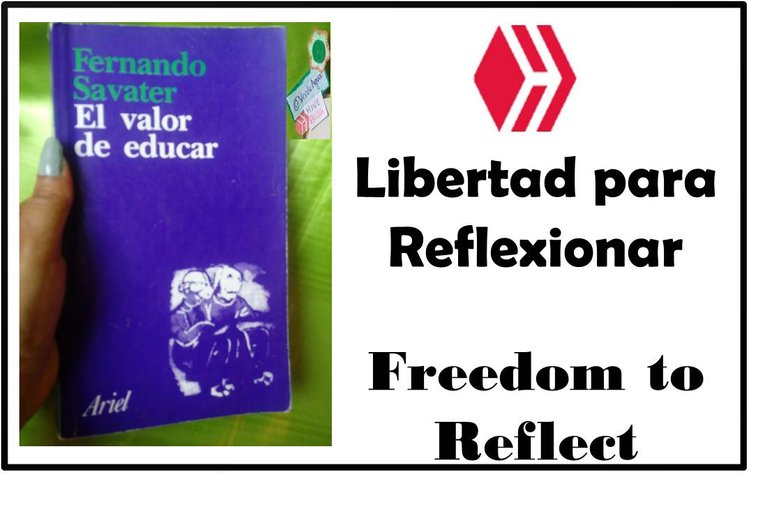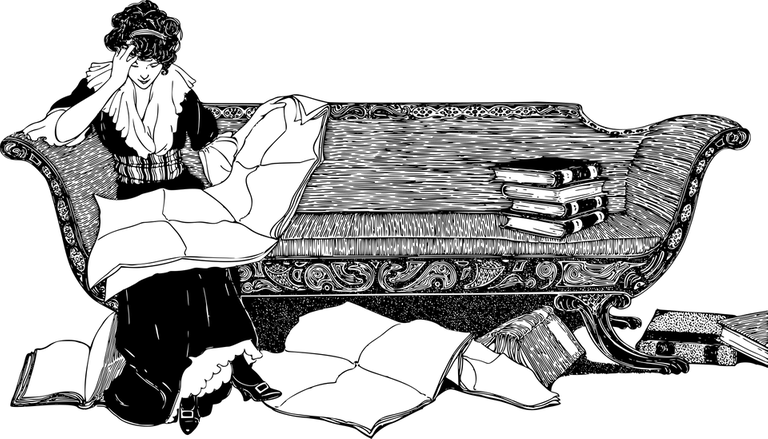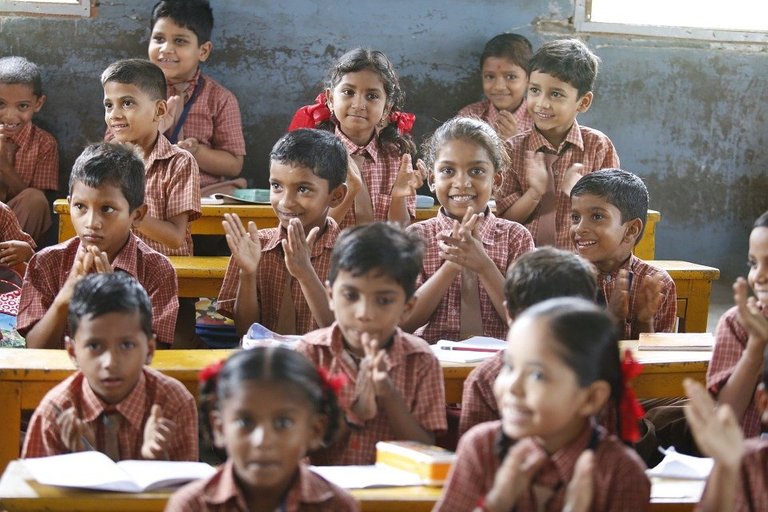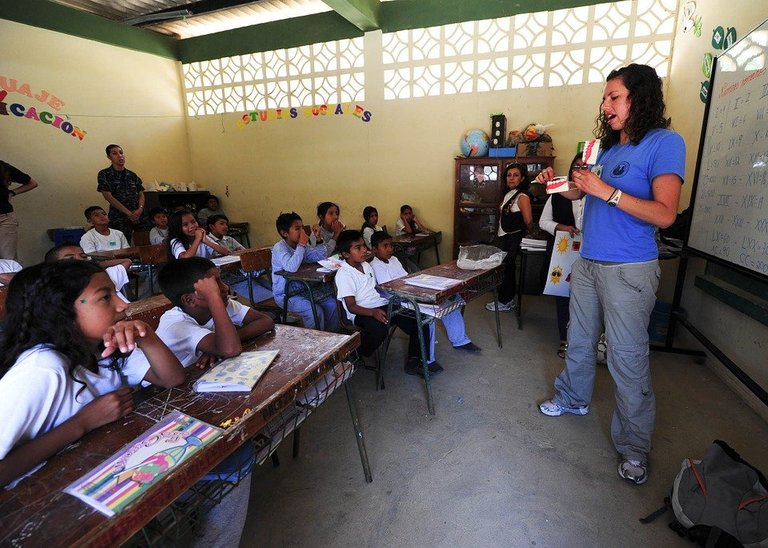
¡Hola comunidad Hive! Espero tengan un hermoso y productivo día, para hoy @VerdeAgua les presenta un reflexionar sobre el libro de Fernando Sabatel el “Valor de Educar” desde la perspectiva de una lectora que ama los libros y quiere crecer en sus destrezas junto a sus congéneres.
Hello Hive community! I hope you have a beautiful and productive day, for today @VerdeAgua presents a reflection on Fernando Sabatel's book "Valor de Educar" from the perspective of a reader who loves books and wants to grow in her skills with her fellow human beings.


Me complace presentarles un intento de acto reflexivo de libertad hacia lo planteado por Fernando Savater en el libro “El valor de educar”, ya que no fue, ni es fácil el intentar romper con las estructuras concebidas para enseñar en nuestros países de origen y que lamentablemente aún persisten en seguirse enseñando a través de saberes de depósito sin aplicabilidad.
I am pleased to present to you an attempt of a reflective act of freedom towards what Fernando Savater has stated in the book "The Value of Educating", since it was not, nor is it easy to try to break with the structures conceived to teach in our countries of origin and that unfortunately still persist in continuing to be taught through knowledge of deposit without applicability.

Hoy puedo decir en libertad a mis congéneres, que no es nada fácil la labor docente. Y tengo el privilegio de conocer a varios. Por eso, valla mis felicitaciones para todos los docentes que se esfuerzan en mejorar sus prácticas educativas, en ese renovar diario de libertad de querer mejorase así mismos, todos los días.
Today I can freely say to my colleagues, that teaching is not easy at all. And I have the privilege of knowing several of them. Therefore, my congratulations to all teachers who strive to improve their educational practices, in that daily renewal of freedom of wanting to improve themselves, every day.

En ese orden de ideas, les comparto la siguiente pregunta, ¿quién es Fernando Savater? Y me respondo. Es un escritor, profesor, activista y catedrático español que nació el 21 de junio en el año 1947. Y hoy a sus 74 años se destaca como uno de los pensadores más reconocido por su pluma prolífica en un estilo agudo e incisivo. Esto debido, a sus numerosos ensayos (filosófico, político y literario), novelista y poseedor de innumerables artículos periodista. También cuenta con más de 23 premios y reconocimientos desde el año 1978 hasta el 2019. Actualmente sus obras se han traducido a vario idiomas como Inglés, Francés, Sueco, Italiano, Portugués, Alemán, Japonés Y Danés.
In that order of ideas, I share with you the following question: who is Fernando Savater? And I answer myself. He is a Spanish writer, professor, activist and professor who was born on June 21, 1947. And today, at 74 years old, he stands out as one of the most recognized thinkers for his prolific pen in a sharp and incisive style. This is due to his numerous essays (philosophical, political and literary), novelist and possessor of countless journalistic articles. He also has more than 23 awards and recognitions from 1978 to 2019. Currently his works have been translated into several languages such as English, French, Swedish, Italian, Portuguese, German, Japanese and Danish.

Dicho lo anterior, quisiera agregar que el libro “El Valor de Educar” se publicó por vez primera en 1991 y para el año 1997 tuvo dos (2) ediciones con la editorial Ariel Barcelona y cinco (5) reimpresiones en Colombia de ese mismo año. Cabe señalar, que se hicieron más reimpresiones a lo largo de estos años. Esto lo menciono porqué hace unos seis (6) años mientras recorría una librería, me topé con el libro y me atrajo el título, yo había leído otros libros del autor, por lo que decidí comprarlo.
Having said this, I would like to add that the book "El Valor de Educar" was published for the first time in 1991 and by 1997 it had two (2) editions with the publishing house Ariel Barcelona and five (5) reprints in Colombia that same year. It should be noted that more reprints were made throughout these years. I mention this because about six (6) years ago while browsing through a bookstore, I came across the book and was attracted by the title, I had read other books by the author, so I decided to buy it.
Después en casa, y en la tranquilidad de la noche empecé a leer su contenido hasta que unos días después que logre su lectura completa. Me reí mucho y no del libro precisamente, sino de mi propio ser, al ver que el título ya contestaba las reflexiones que me hacía para ese entonces cuando terminaba de leer cualquier libro. Les explico, yo tenía el hábito que después de leer un libro tendía a preguntarme, ¿por qué compre el libro?, ¿Lo qué leí cubre mis expectativas?, ¿para qué público está dirigido?, y al final meditaba en qué experiencia me deja lo escrito en el libro.
Then at home, and in the quiet of the night I started to read its content until a few days later I managed to read it completely. I laughed a lot and not precisely at the book, but at my own self, seeing that the title already answered the reflections that I made at that time when I finished reading any book. Let me explain, I had the habit that after reading a book I tended to ask myself, why did I buy the book, does what I read cover my expectations, for what audience is it intended, and at the end I meditated on what experience the book leaves me with.

Por ello, al evocar hoy ese recuerdo, me volví a reír de mí ser, ya que el título respondía esas preguntas qué yo antes me hacía. De allí que esta evocación del pensamiento me entusiasma para escribir sobre la libertad de reflexionar sobre “EL valor de educar” para ustedes. Es meritorio decir, que a partir del año 1997 en muchos países latinoamericanos como Colombia, Venezuela, Argentina… se usó este libro para motivar a los profesores de primaria y secundaria. Hay que recordar que para ese momento, se hablaba mucho de la educación como depósito aunque todavía hoy se hace y práctica.
Therefore, when evoking that memory today, I laughed at myself again, since the title answered those questions I used to ask myself. Hence, this evocation of the thought excites me to write about the freedom to reflect on "THE value of educating" for you. It is worthy to say that since 1997 in many Latin American countries such as Colombia, Venezuela, Argentina... this book was used to motivate primary and secondary school teachers. It should be remembered that at that time, education as a repository was still talked about a lot, although it is still practiced today.

Ciertamente el escritor del libro, sugiere un escenario educativo con reflexiones hacia el papel del maestro como educador a través de la universalización democrática de la educación, esto con la idea de que se eviten las desigualdades. Asimismo, plantea que educar se extiende hasta ese ser humano llamado ¡ciudadano!, y yo agregaría que está lleno de un mundo de valores intrínsecos que se diferencia en lo moral y cívico de unos y otros.
Certainly, the writer of the book suggests an educational scenario with reflections on the role of the teacher as educator through the democratic universalization of education, with the idea of avoiding inequalities. He also suggests that education extends to that human being called "citizen", and I would add that he is full of a world of intrinsic values that differentiates him morally and civically from others.

También el autor menciona que el educador, no debería limitarse a las materias, objetivos, y programas que se enseñan. Inclusive dice,que el docente necesita cuestionarse en las realidades que lo envuelven, temas estos complejos en sí mismos, considero, ya que todavía se siguen debatiendo en el campo educativo de todo el mundo.
The author also mentions that the educator should not limit himself to the subjects, objectives, and programs that are taught. He even says that the teacher needs to question himself on the realities that surround him, complex issues in themselves, I believe, since they are still being debated in the educational field all over the world.

Al releer el libro nuevamente, pienso en la relevancia del aporte que hizo el escritor en lo humanístico, para esos años sobre todo, por lo significativo de su valor. Asimismo en su repetir de ideas, observo libertad que deja el autor al enlaza las posibilidades argumentativas filosóficas y psicológicas para pensar sobre sí mismos como maestros, en cuanto a quién educa, cómo se educa y si el que se educa, es capaz de hacerlo con el mismo, y no sólo con el que recibe la enseñanza.
When I reread the book again, I think of the relevance of the contribution made by the writer in the humanistic, for those years, especially for the significance of its value. Also in its repetition of ideas, I observe freedom that leaves the author to link the philosophical and psychological argumentative possibilities to think about themselves as teachers, as to who educates, how to educate and if the one who is educated, is able to do it with himself, and not only with the one who receives the teaching.

Interesante verdad, yo antes escuchaba de esto y me parecía aburrido, ahora, ya entiendo un poquito más por encontrarme con un entorno de familiares docentes. Este acontecer considero no es aislado, debido a que la educación como acto social necesita de libertad, claridad y toma de decisión que involucre las realidades de los ciudadanos que educan y los que somos educados. Lo cual concuerdo con el escritor cuando expresa su opinión de” valores no acabado” y el “arte de educar” en varios de sus capítulos.
Interesting truth, I used to hear about this and it seemed boring to me, now, I understand a little more because I find myself in an environment of teaching family members. I believe that this is not an isolated event, because education as a social act needs freedom, clarity and decision making that involves the realities of the citizens who educate and those who are educated. I agree with the writer when he expresses his opinion of "unfinished values" and the "art of educating" in several of his chapters.

Pensando en esto, reviso otra vez el libro “el valor de educar” y noto que el autor, en los tres primeros capítulos habla de su postura educativa que considera debe ser más humana, efectiva y de calidad. En cuanto a los otros capítulos restantes, se refuerza estas ideas pero sin llegar a una conclusión final, dejando así el pensamiento libre para que el lector desarrolle sus propias ideas sobre el valor de educar en el mundo educativo, partiendo desde la familia y en un continuar de la escuela que sería para complementar, y escrudiñar del educando sobre su propia existencia como actividad critica constante de cada etapa escolar
Thinking about this, I review again the book "the value of educating" and I notice that the author, in the first three chapters talks about his educational position which he considers should be more humane, effective and of quality. As for the other remaining chapters, he reinforces these ideas but without reaching a final conclusion, thus leaving the reader free to develop his own ideas about the value of educating in the educational world, starting from the family and continuing from the school, which would be to complement and scrutinize the learner about his own existence as a constant critical activity of each school stage.

Para culminar diré que en esta reflexión de libertad, aprendí que el arte de educar forma parte de la naturalidad humana, y esto a su vez favorece el pensamiento y la toma de decisiones para saber elegir lo que se necesita "o" se quiere y así reafirmar que el aprender sólo se da, cuando nos relacionamos los unos con los otros.
To conclude, I will say that in this reflection of freedom, I learned that the art of educating is part of human nature, which in turn favors thinking and decision making to know how to choose what is needed or wanted and thus reaffirm that learning only happens when we relate to each other.
Razonando esto, me encuentro con un ejemplo palpable de ello, ¿cuál? ¡nosotros! lo que iniciamos es esta comunidad Hive, y los que ya están desde hace tiempo. Lo que se traduce en amor para construir, con el fin de poder volar libre hacia nuevos conocimientos y aprender de otros que han realizado el viaje, pero con la libertad de hacerlo con originalidad, cuando lo hacemos por nosotros mismos, en ese hermoso ejercicio de vivir el valor de educar. Me despido agradecida de que encontraran un poco de su tiempo valioso para leer "Libertad para reflexionar”.
Reasoning this, I come across a palpable example of it, what? us! what we started is this Hive community, and those who have been around for a long time. Which translates into love to build, in order to be able to fly free towards new knowledge and learn from others who have made the journey, but with the freedom to do it with originality, when we do it by ourselves, in that beautiful exercise of living the value of educating. I say goodbye grateful that you found some of your valuable time to read "freedom to reflect".

REFERENCIAS
La imagen de la portada fue tomada por mí con un celular Lg G3 y editadas en Power Point
La barra fue creación propia y use la herramienta de formas, que están presente en Power Point.
REFERENCES
The cover image was taken by me with a Lg G3 cell phone and edited in Power Point.
The bar was my own creation and I used the shapes tool, which are present in Power Point.

Congratulations @verdeagua! You have completed the following achievement on the Hive blockchain and have been rewarded with new badge(s) :
Your next target is to reach 300 upvotes.
You can view your badges on your board and compare yourself to others in the Ranking
If you no longer want to receive notifications, reply to this comment with the word
STOP